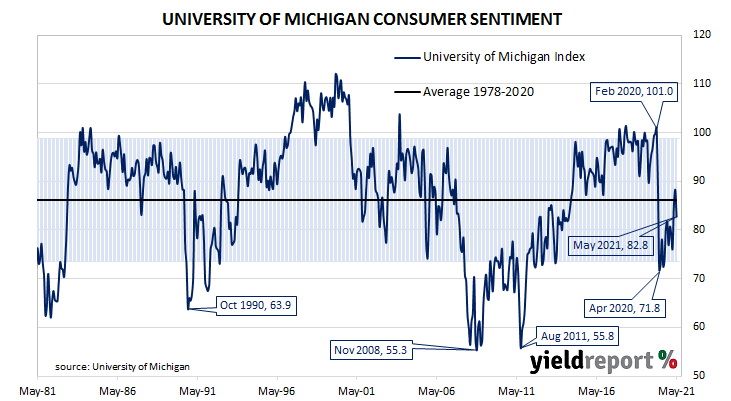Summary: US consumer confidence dims in May; University of Michigan index well below consensus figure; views of present conditions, future conditions deteriorate; driven by households expecting higher future inflation rates; “easier for retailers to pass higher costs”.
US consumer confidence started 2020 at an elevated level. However, surveys had begun to reflect a growing uneasiness with the global spread of COVID-19 and its reach into the US by March of that year. After a plunge in the following month, household confidence recovered in a haphazard fashion, holding at below-average levels. While recent surveys suggested optimism may be about to rise, the most-recent one has not lent weight to this argument.
The latest survey conducted by the University of Michigan indicates the average confidence level of US households deteriorated in May. The University’s preliminary reading from its Index of Consumer Sentiment registered 82.8, well below the generally expected figure of 90.0 and noticeably lower than April’s final figure of 88.3. Consumers’ views of current conditions and expectations regarding future conditions both deteriorated in comparison to those held at the time of the April survey.
“Consumer confidence in early May tumbled due to higher inflation; the highest expected year-ahead inflation rate as well as the highest long term inflation rate in the past decade. Rising inflation also meant that real income expectations were the weakest in five years,” said the University’s Surveys of Consumers chief economist, Richard Curtin.

The report was released on the same day as April’s retail sales numbers and industrial production figures. US Treasury bond yields moved lower and, by the end of the day, the 2-year Treasury yield had slipped 1bp to 0.15%, the 10-year yield had lost 2bps to 1.64% while the 30-year yield finished 6bps lower at 2.35%.
ANZ Head of Australian Economic David Plank said, “Consumers don’t set prices, but when they expect inflation it certainly makes it easier for retailers to pass higher costs on without fear of backlash.”

